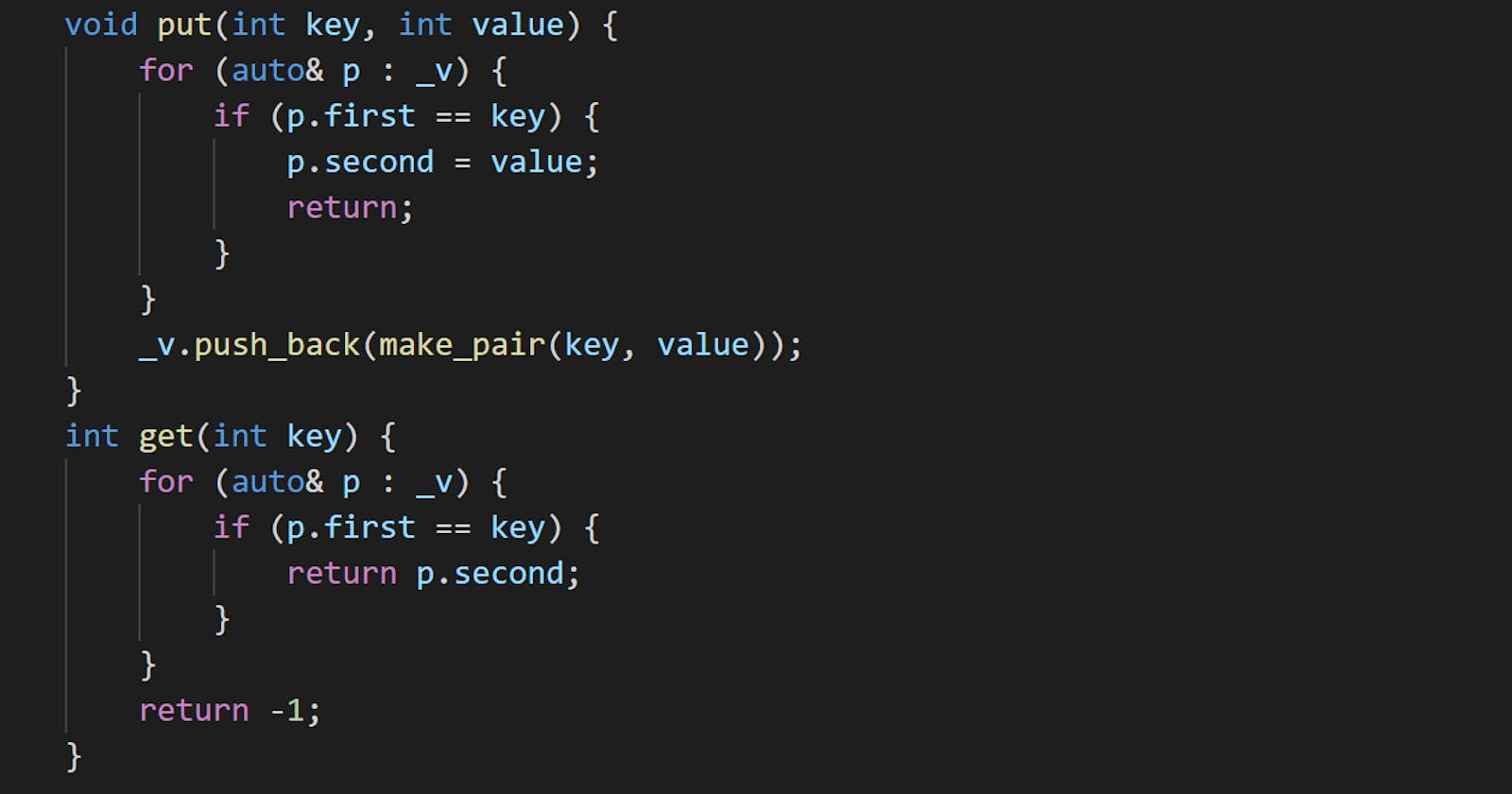Problem statement
Design a HashMap without using any built-in hash table libraries.
Implement the MyHashMap class:
MyHashMap()initializes the object with an empty map.void put(int key, int value)inserts a(key, value)pair into theHashMap. If thekeyalready exists in the map, update the correspondingvalue.int get(int key)returns thevalueto which the specifiedkeyis mapped, or-1if this map contains no mapping for thekey.void remove(key)removes thekeyand its correspondingvalueif the map contains the mapping for thekey.
Example 1
Input
["MyHashMap", "put", "put", "get", "get", "put", "get", "remove", "get"]
[[], [1, 1], [2, 2], [1], [3], [2, 1], [2], [2], [2]]
Output
[null, null, null, 1, -1, null, 1, null, -1]
Explanation
MyHashMap myHashMap = new MyHashMap();
myHashMap.put(1, 1); // The map is now [[1,1]]
myHashMap.put(2, 2); // The map is now [[1,1], [2,2]]
myHashMap.get(1); // return 1, The map is now [[1,1], [2,2]]
myHashMap.get(3); // return -1 (i.e., not found), The map is now [[1,1], [2,2]]
myHashMap.put(2, 1); // The map is now [[1,1], [2,1]] (i.e., update the existing value)
myHashMap.get(2); // return 1, The map is now [[1,1], [2,1]]
myHashMap.remove(2); // remove the mapping for 2, The map is now [[1,1]]
myHashMap.get(2); // return -1 (i.e., not found), The map is now [[1,1]]
Constraints
0 <= key, value <= 10^6.- At most
10^4calls will be made toput,get, andremove.
Solution 1: Store all keys' values
Code
#include <iostream>
#include <vector>
using namespace std;
class MyHashMap {
vector<int> _v;
public:
MyHashMap() : _v(1000001, -1) {
}
void put(int key, int value) {
_v[key] = value;
}
int get(int key) {
return _v[key];
}
void remove(int key) {
_v[key] = -1;
}
};
int main() {
MyHashMap m;
m.put(1, 1);
m.put(2, 2);
cout << m.get(1) << endl;
cout << m.get(3) << endl;
m.put(2, 1);
cout << m.get(2) << endl;
m.remove(2);
cout << m.get(2) << endl;
}
Output:
1
-1
1
-1
Complexity
- Runtime:
O(1). - Extra space:
KEY_MAX, which is10^6in this problem.
Solution 2: Store only real keys
Code
#include <iostream>
#include <vector>
using namespace std;
class MyHashMap {
vector<pair<int, int> > _v;
public:
MyHashMap() {
}
void put(int key, int value) {
for (auto& p : _v) {
if (p.first == key) {
p.second = value;
return;
}
}
_v.push_back(make_pair(key, value));
}
int get(int key) {
for (auto& p : _v) {
if (p.first == key) {
return p.second;
}
}
return -1;
}
void remove(int key) {
auto it = _v.begin();
while (it != _v.end()) {
if (it->first == key) {
_v.erase(it);
return;
} else {
it++;
}
}
}
};
int main() {
MyHashMap m;
m.put(1, 1);
m.put(2, 2);
cout << m.get(1) << endl;
cout << m.get(3) << endl;
m.put(2, 1);
cout << m.get(2) << endl;
m.remove(2);
cout << m.get(2) << endl;
}
Output:
1
-1
1
-1
Complexity
- Runtime:
O(N), whereNis the number of keys. - Extra space:
O(2N).
